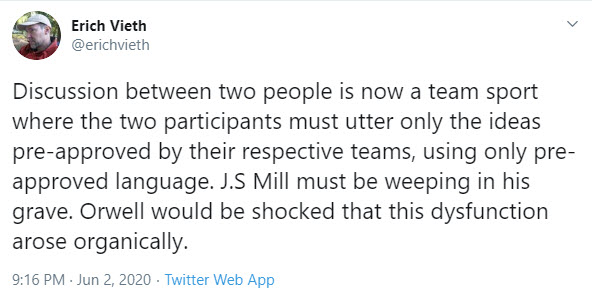The death of George Floyd was horrific and revolting, as was the purported "cause of death" contained in the criminal complaint. A newly released private autopsy now verifies what we all saw with our own eyes: George Floyd was murdered by the police. And now, riots are spreading across the United States.
Reading social media over the last few days, one would get the impression that Martin Luther King would approve of this destructive rioting we are witnessing in Minneapolis and many other American Cities. What I am seeing on social media is that rioting is justified because it supposedly  results only in property damage or that insurance will pay for all the damage. Here is the money quote in which MLK purportedly justified riots: "But in the final analysis, a riot is the language of the unheard." Even MLK's son Martin Luther King III deceptively uttered his father's quote and he was promptly corrected with much vigor on Twitter. The pro-rioting crowd is unhinged. As though it is necessary to destroy property, livelihoods and even lives in order to exercise the First Amendment. As though "rioting is speech" any more than "money is speech." As though destroying businesses, burning the property of innocent third parties or smashing the skulls of human beings constitutes speech any more than funneling corrupt money to political candidates. For these folks, why stop at riots? War is now speech too, right? It appears that left now meets right: we've politically come full circle.
results only in property damage or that insurance will pay for all the damage. Here is the money quote in which MLK purportedly justified riots: "But in the final analysis, a riot is the language of the unheard." Even MLK's son Martin Luther King III deceptively uttered his father's quote and he was promptly corrected with much vigor on Twitter. The pro-rioting crowd is unhinged. As though it is necessary to destroy property, livelihoods and even lives in order to exercise the First Amendment. As though "rioting is speech" any more than "money is speech." As though destroying businesses, burning the property of innocent third parties or smashing the skulls of human beings constitutes speech any more than funneling corrupt money to political candidates. For these folks, why stop at riots? War is now speech too, right? It appears that left now meets right: we've politically come full circle.
Along with the riots, we are thus witnessing selective and deceptive quote-mongering in an attempt to turn Martin Luther King's teachings upside down. He never condoned rioting and he opposed riots for specific carefully articulated reasons. Here are MLK's 1967 and 1968 statements on rioting:
It is as necessary for me to be as vigorous in condemning the conditions which cause persons to feel that they must engage in riotous activities as it is for me to condemn riots. I think America must see that riots do not develop out of thin air. Certain conditions continue to exist in our society which must be condemned as vigorously as we condemn riots. But in the final analysis, a riot is the language of the unheard. And what is it that America has failed to hear? It has failed to hear that the plight of the Negro poor has worsened over the last few years. It has failed to hear that the promises of freedom and justice have not been met.
. . . .
Let me say as I’ve always said, and I will always continue to say, that riots are socially destructive and self-defeating. I’m still convinced that nonviolence is the most potent weapon available to oppressed people in their struggle for freedom and justice. I feel that violence will only create more social problems than they will solve. That in a real sense it is impracticable for the Negro to even think of mounting a violent revolution in the United States. So I will continue to condemn riots, and continue to say to my brothers and sisters that this is not the way. And continue to affirm that there is another way.
. . . .
And I would be the first to say that I am still committed to militant, powerful, massive, nonviolence as the most potent weapon in grappling with the problem from a direct action point of view. I’m absolutely convinced that a riot merely intensifies the fears of the white community while relieving the guilt. And I feel that we must always work with an effective, powerful weapon and method that brings about tangible results. But it is not enough for me to stand before you tonight and condemn riots. It would be morally irresponsible for me to do that without, at the same time, condemning the contingent, intolerable conditions that exist in our society. These conditions are the things that cause individuals to feel that they have no other alternative than to engage in violent rebellions to get attention. And I must say tonight that a riot is the language of the unheard. And what is it America has failed to hear? It has failed to hear that the plight of the negro poor has worsened over the last twelve or fifteen years.
. . . .
Finally,
Now what I'm saying is this: I would like for all of us to believe in non-violence, but I'm here to say tonight that if every Negro in the United States turns against non-violence, I'm going to stand up as a lone voice and say, "This is the wrong way!"
If you really truly believe that riots are justified in response to the death of George Floyd, let's not pervert the teachings of Martin Luther King in the process. You are not preaching violence in kinship with MLK. If you are reveling the ongoing joyride of violence through America's city centers, stop (if you can) to remember that facts are not negotiable. For his entire life, MLK never wavered from the path of non-violence. He never approved of rioting, even where the injury was egregious, as it was in the case of George Floyd.
I was provoked to write this article after reading an article on the same topic. See "No, Martin Luther King Was Not Pro-Riot" at the National Review.


